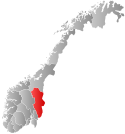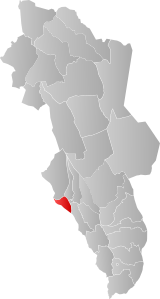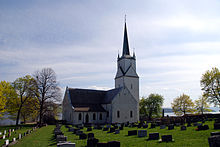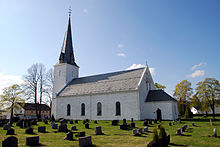Nes is a former municipality in the old Hedmark county, Norway. The 177-square-kilometre (68 sq mi) municipality existed from 1838 until its dissolution in 1964 when it became part of Ringsaker Municipality. The administrative centre was the village of Tingnes where Nes Church is located. The largest village in Nes was Stavsjø where the Stavsjø Church is located. The municipality included the Nes peninsula and the island of Helgøya which both are surrounded by the large lake Mjøsa, Norway's largest lake.[3]
Nes Municipality
Nes herred | |
|---|---|
 View of the Nes area | |
 Hedmark within Norway | |
 Nes within Hedmark | |
| Coordinates: 60°45′44″N 10°56′29″E / 60.76222°N 10.94139°E | |
| Country | Norway |
| County | Hedmark |
| District | Hedmarken |
| Established | 1 Jan 1838 |
| • Created as | Formannskapsdistrikt |
| Disestablished | 1 Jan 1964 |
| • Succeeded by | Ringsaker Municipality |
| Administrative centre | Tingnes |
| Area (upon dissolution) | |
• Total | 177 km2 (68 sq mi) |
| Population (1964) | |
• Total | 4,184 |
| • Density | 24/km2 (61/sq mi) |
| Demonym | Nesning[1] |
| Time zone | UTC+01:00 (CET) |
| • Summer (DST) | UTC+02:00 (CEST) |
| ISO 3166 code | NO-0411[2] |


History
editThe parish of Næs was established as a municipality on 1 January 1838 (see formannskapsdistrikt law). During the 1960s, there were many municipal mergers across Norway due to the work of the Schei Committee. On 1 January 1964, the municipality of Nes (population: 4,184) was merged with the municipality of Furnes (population: 7,288), the municipality of Ringsaker (population: 16,490), and the Hamarsberget and Vikersødegården areas of the municipality of Vang (population: 34) to create the new, larger Ringsaker Municipality.[4]
Name
editThe municipality (originally the parish) is named after the old Nes farm (Old Norse: Nes) since the first Nes Church was built there. The name is identical to the word nes which means "headland".[5]
Government
editWhile it existed, this municipality was responsible for primary education (through 10th grade), outpatient health services, senior citizen services, unemployment, social services, zoning, economic development, and municipal roads. During its existence, this municipality was governed by a municipal council of directly elected representatives. The mayor was indirectly elected by a vote of the municipal council.[6]
Municipal council
editThe municipal council (Herredsstyre) of Nes was made up of 23 representatives that were elected to four year terms. The party breakdown of the final municipal council was as follows:
| Party name (in Norwegian) | Number of representatives | |
|---|---|---|
| Labour Party (Arbeiderpartiet) | 13 | |
| Conservative Party (Høyre) | 2 | |
| Centre Party (Senterpartiet) | 5 | |
| Liberal Party (Venstre) | 3 | |
| Total number of members: | 23 | |
| Party name (in Norwegian) | Number of representatives | |
|---|---|---|
| Labour Party (Arbeiderpartiet) | 14 | |
| Joint List(s) of Non-Socialist Parties (Borgerlige Felleslister) | 9 | |
| Total number of members: | 23 | |
| Party name (in Norwegian) | Number of representatives | |
|---|---|---|
| Labour Party (Arbeiderpartiet) | 15 | |
| Joint List(s) of Non-Socialist Parties (Borgerlige Felleslister) | 9 | |
| Total number of members: | 24 | |
| Party name (in Norwegian) | Number of representatives | |
|---|---|---|
| Labour Party (Arbeiderpartiet) | 16 | |
| Conservative Party (Høyre) | 2 | |
| Farmers' Party (Bondepartiet) | 6 | |
| Total number of members: | 24 | |
| Party name (in Norwegian) | Number of representatives | |
|---|---|---|
| Labour Party (Arbeiderpartiet) | 16 | |
| Joint List(s) of Non-Socialist Parties (Borgerlige Felleslister) | 8 | |
| Total number of members: | 24 | |
| Party name (in Norwegian) | Number of representatives | |
|---|---|---|
| Labour Party (Arbeiderpartiet) | 14 | |
| Conservative Party (Høyre) | 3 | |
| Farmers' Party (Bondepartiet) | 7 | |
| Total number of members: | 24 | |
| Note: Due to the German occupation of Norway during World War II, no elections were held for new municipal councils until after the war ended in 1945. | ||
See also
editReferences
edit- ^ "Navn på steder og personer: Innbyggjarnamn" (in Norwegian). Språkrådet.
- ^ Bolstad, Erik; Thorsnæs, Geir, eds. (9 January 2024). "Kommunenummer". Store norske leksikon (in Norwegian). Foreningen Store norske leksikon.
- ^ Mæhlum, Lars, ed. (4 February 2020). "Nes (sogn i Ringsaker)". Store norske leksikon (in Norwegian). Kunnskapsforlaget. Retrieved 2 April 2022.
- ^ Jukvam, Dag (1999). "Historisk oversikt over endringer i kommune- og fylkesinndelingen" (PDF) (in Norwegian). Statistisk sentralbyrå. ISBN 9788253746845.
- ^ Rygh, Oluf (1900). Norske gaardnavne: Hedmarkens amt (in Norwegian) (3 ed.). Kristiania, Norge: W. C. Fabritius & sønners bogtrikkeri. p. 47.
- ^ Hansen, Tore; Vabo, Signy Irene, eds. (20 September 2022). "kommunestyre". Store norske leksikon (in Norwegian). Kunnskapsforlaget. Retrieved 1 January 2023.
- ^ "Kommunevalgene og Ordførervalgene 1959" (PDF) (in Norwegian). Oslo: Statistisk sentralbyrå. 1960.
- ^ "Kommunevalgene og Ordførervalgene 1955" (PDF) (in Norwegian). Oslo: Statistisk sentralbyrå. 1957.
- ^ "Kommunevalgene og Ordførervalgene 1951" (PDF) (in Norwegian). Oslo: Statistisk sentralbyrå. 1952.
- ^ "Kommunevalgene og Ordførervalgene 1947" (PDF) (in Norwegian). Oslo: Statistisk sentralbyrå. 1948.
- ^ "Kommunevalgene og Ordførervalgene 1945" (PDF) (in Norwegian). Oslo: Statistisk sentralbyrå. 1947.
- ^ "Kommunevalgene og Ordførervalgene 1937" (PDF) (in Norwegian). Oslo: Statistisk sentralbyrå. 1938.